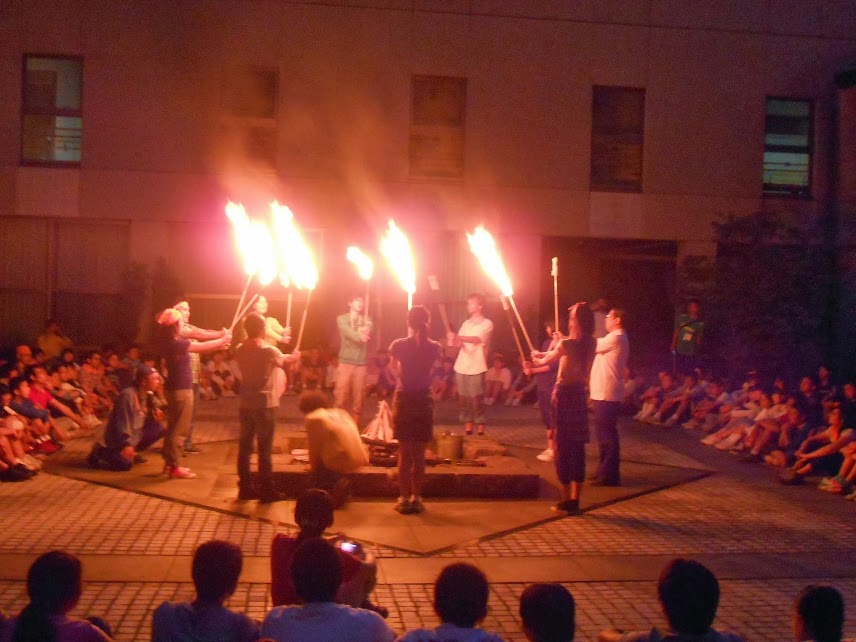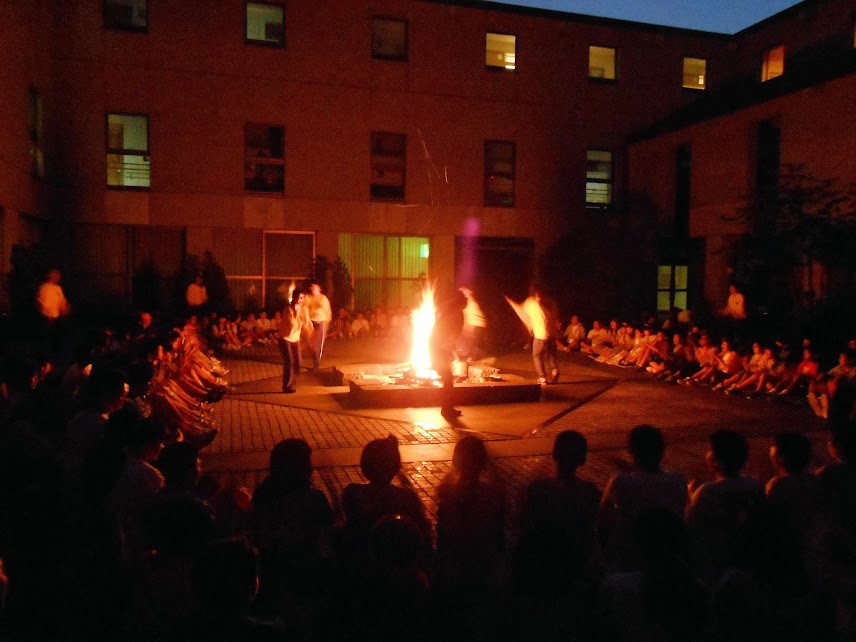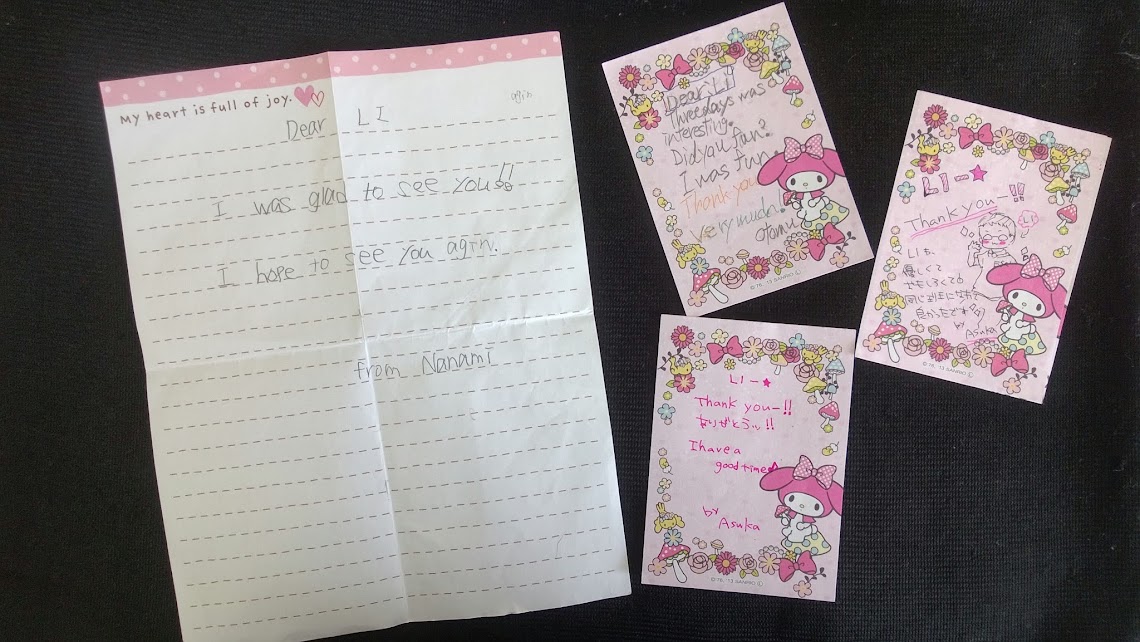
Continuing
my summer holiday recount, I was selected along with 249 other foreign
students to teach English to Japanese junior high school students at English
Summer Camp held at the Shirakabajo campsite in Nasu, Tochigi. There were
indeed 250 foreign students helping out altogether, but we didn't all go at the
same time. Instead, the leaders were divided into 12 groups (rounds), for the
12 respective schools that participated. All of the students were 2nd year
junior high schoolers.
There
was one condition for all the leaders: do not speak Japanese with the children!
You must speak in English. Before the camp, I was thinking that wasn't too
unreasonable. They're here to improve their English after all. Can't be that
bad, right?
Pre-camp prep
I was
a captain in the 10th round of the camp, which was held 9-11 August. The night
before the camp, the captains for my round gathered for a briefing, and to
receive our shirts:

In
our round, there were 27 captains all from different countries (excluding two
Chinese girls). We stayed in a hotel overnight, and made our way to the
campsite in the morning.
Day 1
We
met all the kids, and found out who was in our group. Six to seven kids were
assigned to each captain, and most of the camp's activities were conducted in
these groups. I was glad to have three kids out of six in my group able to
understand any English at all, because apparently many groups has at most 1.
Having said that three kids understood English, in characteristic Japanese
style, they tended to pretend their English was worse than it actually was.
Initially I actually thought they couldn't speak any English at all, which
would be a very troublesome three days since we weren't allowed to speak
Japanese to them. Slowly over time, they became more relaxed and were willing
to engage in English, and even tried to understand more challenging conversations.
It took the most of the three days to happen though!
To
facilitate the relationships between the captains and students and encourage
them to open up, we began with some ice breaker games. One game we played was a
cross between scissors paper rock and gymnastics. This was a snapshot from our
game:

In
the afternoon, we showcased our country's culture. I showed my kids some of
Australia's famous animals, buildings, and landscapes. They also learned
correctly that Canberra, not Sydney, was the capital of Australia.

After
dinner, each group went to practice the highlight presentation on this camp:
the International Cultural Presentation, or ICP for short. Every captain came
prepared with a short dance, song or both iconic to their own culture, and we
were to teach our group how to perform it. The presentations themselves were
all in each captain's own country's native language, if speaking was involved,
but we taught it in English. I don't consider the fact that my prepared
material was in English to be an advantage over the other foreign languages,
since English was just as foreign to the kids. There wasn't too much prep time
- we had a couple of hours this day, a couple of hours the next day, then the
actual performance was that very same evening!
Day 2
Day 2
was arguably the most jam-packed day. All introductory formalities were out of
the way so we could move onto actually interacting.
The
first interactive activity was signing bandanas. The captains took turns going
around different groups, briefly getting to know some other children, and
signing their bandanas and having our own signed by them. In terms of language
level, it wasn't any more difficult than "What's your name?",
"What's your hobby?" but to them it was at the right difficulty
level.
 |
| Ok so if you bother to look at the details you'll notice there are birthday messages. This particular bandana was prepared for a boy whose birthday fell perfectly on the third day of the camp. Everyone received the same style bandana. |
We
then wore these bandanas and set off for orienteering in the woods.
The
aim of the orienteering activity was to locate signs with clues planted along
the hiking tracks, and to solve the clues to find the name of a country, which
we had to write into a blank crossword grid. It was actually quite challenging!
Not the English used; that was easy to understand. But the clues were sometimes
very specific details that required a broad general knowledge. Needless to say,
we left a lot of the words blank. There were also various mini-games run by the
camp staff along the way that offered bonus points, which were fun. I was proud
of the effort my kids put in, but in the end other groups got first, second and
third place. There were 27 groups, so it wasn't too disappointing.

The
hiking was over, but the best part of the day was still to come...

CAMPFIRE!!!
:D Apparently the students from many of the other rounds missed out because of
bad weather on their second day. They had rainy weather plan B instead, which
involved indoor games, and definitely no campfire. It was an epic ceremony-like
event, initiated by some of the captains lighting the fire with torches, and
involved everyone dancing the hokey pokey around the campfire. Captains, who
were instructed at a previous group meeting, danced it twice because we first
showed the kids how it was done :D It was so much fun, and so many memories
created.

The
campfire got us all revved up for the final instalment of the day, the
performance we had been rehearsing so intensely for. Our round had so many
students (and subsequently so many groups) that we had to split into two groups
in order to get through everyone. Everyone's performance was indeed unique and
fun to watch, and all the kids did very well particularly considering the
limited time they had to rehearse.
I
taught my kids the kookaburra song. I can't show pictures of the kids
performing on this public blog, but here's the song from YouTube to give you an
idea of what they did. I added a bit of my own improvised accompanying
gestures.
Day 3(2.5?)
 |
| Presenting the bandana signed by all the captains to the birthday boy |
The
final day of the camp, or more like final half a day. We left the campsite in
Nasu city pretty early, to go to an amusement park called Rindoh
lake family ranch. I'm not sure why, but the captains were encouraged to
let their kids go off on their own, and to explore the park with other captains
instead. Hearing from captains from the other rounds, being asked to separate with our group at the
amusement park was a very unusual thing since it seems in all the other rounds,
the captains were responsible. Oh well, I'm not complaining. We captains spent
a bit of time at the petting zoo with the sheep and alpacas.
We
had lunch in the amusement park, again all the captains eating separate from
the kids. The meal was a nostalgic return to
Hokkaido, eating Genghis
Khan. It was nice to have lamb, a rare meat form in Japan.
After
we left the amusement park, we boarded the bus for what we realised was the
final time. Captains sat with their group's kids, and I exchanged farewell
messages with my group on the way back. I was happy to see that the messages I
received were written in English. They tried very hard indeed, and made
progress over the course of this camp. I'm very proud of them! I hope this
experience serves as an inspiration for them to keep trying, and maybe one day
I'll meet them again.

I'm
very thankful toward my kids who were hospitable to me during mealtimes,
proactively offering me tea and taking my dishes after the meal. I'm also
thankful to the co-ordinators of this camp, who put in so much effort to make
it happen. I think it's a great thing they're inspiring the kids of the future
to become global citizens. This camp far exceeded my expectations for how
rewarding and fun it would be. Time allowing, I definitely hope to participate
again next year.
